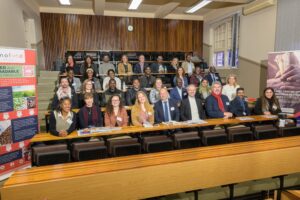
The Food and Microbiota in Africa project was launched at the University of Pretoria.
South Africa faces a triple burden of malnutrition, characterised by protein-energy deficiencies, micronutrient deficiencies and overweight/obesity. The demand for easy-to-prepare but less nutritionally dense food products is growing in the context of rapid urbanisation and economic development. This leads to a nutritional transition, with energy-dense and nutrient-poor diets replacing traditional diets, more sedentary lifestyles, and reduced exposure to environmental and food microbial sources. Other sub-Saharan African countries, such as Senegal, face the same problem while having a wealth of traditional foods.
In response, the “Food and Microbiota in Africa” (FAMA) project was launched on 4 July 2024, at CoE-FS co-host, the University of Pretoria (UP). The FAMA project aims to assess the role of traditional African foods in improving gut microbiota, and reducing the triple burden of malnutrition in South African and Senegalese populations. The project was designed within the “Transforming Food Systems and Agriculture through Research in Partnership with Africa” (TSARA) initiative, and builds on existing scientific collaboration among partners through previous projects and that of the CoE-FS.
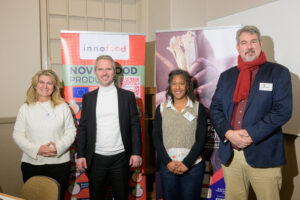
From left to right: Prof Lise Korsten; His Excellency David Martinon, the Ambassador of France to South Africa, Malawi and Lesotho; Dr Arlène Alpha; and Prof Barend Erasmus.
FAMA is a project financed under Fond Équipe France, from the French Ministry of Foreign Affairs, and has project research partners from across South Africa, Senegal and Europe: the CoE-FS; UP; the University of the Western Cape; Agricultural Research Council (ARC); Council for Scientific and Industrialised Research; Laboratoire de Recherche sur les Transformations Économiques et Sociales – Institut Fondamental d’Afrique Noire de l’Université Cheick Anta Diop (LARTES-IFAN); the French Agricultural Research Centre for International Development (CIRAD); and the National Research Institute for Agriculture, Food and Environment (INRAE). In addition to the research partners, the project includes an NGO, Siyazisiza Trust (South Africa) and an agro-processing enterprise, Puratos (Europe).
Dr Arlène Alpha (CIRAD/CoE-FS) is the project lead.
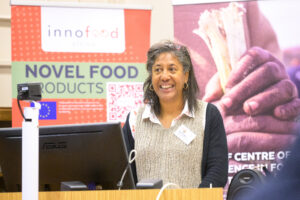
Under her leadership, the FAMA project will focus on three components: knowledge production, pilot actions with farmers and processors, and policy dialogue and recommendations.
“We have to combine our forces, our expertise to address a common problem,” said Dr Alpha, of FAMA’s objective, to build on traditional African foods as an alternative food system to reduce the triple burden of malnutrition and prevent non-communicable diseases in South Africa and Senegal, the two research sites.
Joining Dr Alpha from the CoE-FS are co-director Professor Lise Korsten, nutrition lead Professor Rina Swart, innovation and technology co-principal investigator Professor Naushad Emmambux, postdoctoral researcher Dr Eness Paidamoyo Mutsvangwa-Sammie, and PhD researcher Florian Kroll.
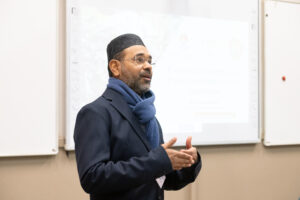
Prof Naushad Emmambux is a CoE-FS principal investigator, based at the University of Pretoria.
Opening the launch was Professor Barend Erasmus, Dean of the Faculty of Natural and Agricultural Sciences at UP. Professor Erasmus also serves on the CoE-FS’s Steering Committee. He noted that the faculty is a host of the TSARA initiative, and hosts a portion of its secretariat, highlighting the faculty’s commitment to collaboration and research excellence.
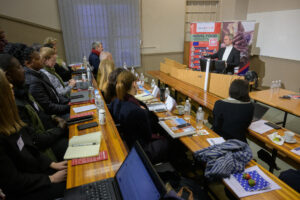
The keynote address was delivered by the French Ambassador to South Africa, His Excellency David Martinon. FAMA is financed under Fond Équipe France, from the French Ministry of Foreign Affairs.
The keynote was delivered by His Excellency David Martinon, the Ambassador of France to South Africa, Malawi and Lesotho. Professor Korsten delivered remarks on behalf of the CoE-FS. Sharing lessons from the 10 years of the CoE-FS, Korsten emphasised the need for nurturing trust between researchers for transdisciplinary research excellence.
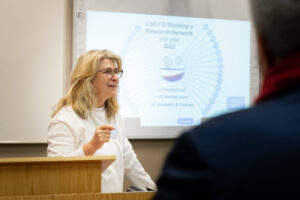
CoE-FS Co-director and President of the African Academy of Sciences, Prof Lise Korsten, delivers remarks on behalf of the CoE-FS.
“Your breakthrough will come if you can cross those boundaries,” she said.
Speakers from the rest of the project’s partners included Dr Mariette Truter (ARC) and Dr Moustapha Seye (LARTES-IFAN).
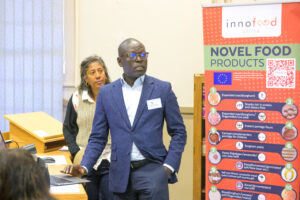
Dr Moustapha Seye shared his work on “Identifying the main determinants of the consumption of traditional foods in Senegal”.
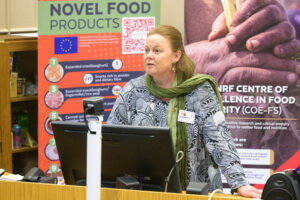
Dr Mariette Truter introduced the second project component, “Pilot actions with farmers and processors”, with a presentation on ‘Accompanying framers and processors’ innovations on traditional foods’.
To find out more about the FAMA Project, view the brochure here.
related Articles
Research initiative to tackle food security, global warming
Photo: Jessie Crettenden / Pexels. “In an effort to bolster cooperation between European and African countries as they face joint…
African and French institutions partner up through TSARA, a research plan for...
Launch of the TSARA initiative on 3 March 2022 at the Paris International Agricultural Show. Professor Julian May, director of…



